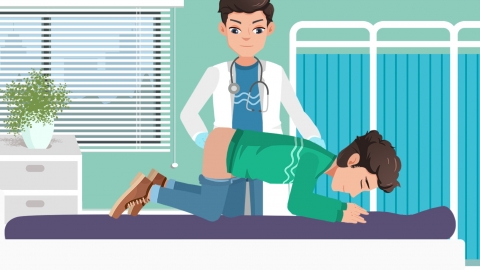What could be the reason for a lump growing near the anus?
The term "butt hole" usually refers to the anus. In general, common causes of a lump near the anus include prolonged sitting and pressure, dietary irritation, external hemorrhoids, perianal abscess, rectal prolapse, etc. If discomfort occurs, it is recommended to seek timely medical evaluation and treatment at a正规 hospital. Specific explanations are as follows:
1. Prolonged Sitting and Pressure
Long-term sitting can impair local blood circulation in the anal area, obstruct venous return, and lead to tissue swelling and lump formation, often accompanied by mild heaviness or discomfort. To prevent this, get up and move for 5–10 minutes every hour of sitting, use breathable and soft seating cushions, and perform warm sitz baths daily for 10 minutes to promote local blood flow.

2. Dietary Irritation
Regular consumption of spicy or fried foods can irritate the anal mucosa, leading to localized congestion and swelling that forms a lump, possibly accompanied by a burning sensation during bowel movements. Adjust your diet to be light and easily digestible, increase intake of vegetables and fruits to boost dietary fiber, drink plenty of water, and avoid spicy or fried foods.
3. External Hemorrhoids
Varicose enlargement of venous plexuses or connective tissue proliferation at the anal margin can form soft lumps, which worsen after prolonged sitting or defecation, often accompanied by pain and itching. Under medical guidance, topical medications such as Ma Yinglong Musk Hemorrhoid Ointment, Gangtai suppositories, or oral diosmin tablets may be used. Avoid prolonged sitting or standing, maintain smooth bowel movements, and in severe cases, surgical excision of external hemorrhoids may be required.
4. Perianal Abscess
Infection of soft tissues around the anus leads to abscess formation, presenting as a red, swollen, painful lump, often accompanied by fever and significant tenderness. Under medical supervision, antibiotics such as cefixime capsules, metronidazole tablets, or levofloxacin tablets may be prescribed. Once the abscess matures, incision and drainage surgery is necessary. Regular wound dressing changes after surgery are essential to keep the area clean.
5. Rectal Prolapse
Prolapse of the rectal mucosa or full-thickness rectal wall through the anus forms a purplish-red lump. In early stages, it may retract spontaneously; later, manual reduction may be needed. Under medical guidance, medications such as Buzhong Yiqi Pills, potassium permanganate solution, or compound alginated ester suppositories may be used. In severe cases, rectal suspension and fixation surgery may be required. After surgery, avoid intense coughing and constipation.
In daily life, avoid prolonged sitting or standing, engage in moderate physical activity, maintain a light diet to prevent constipation, develop regular bowel habits and avoid straining during defecation, and undergo routine anal examinations to detect abnormalities early.




